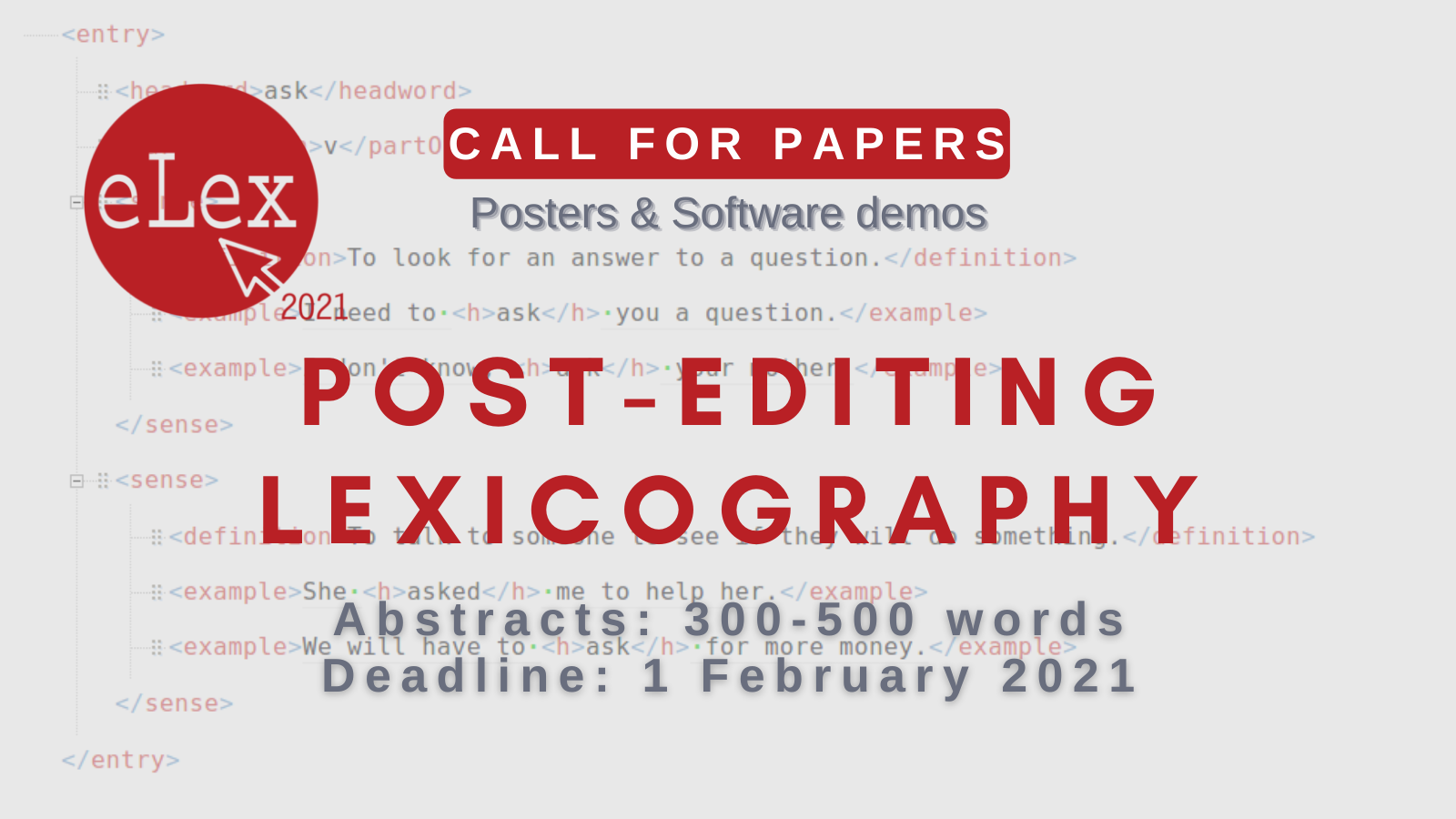electronic Lexicography: Post-Editing Lexicography (eLex2021)
- Date
- 5. – 7.7.2021
- Location
- virtual
ELEXIS was co-organising the 7th biennial conference on electronic lexicography, eLex 2021: Post-Editing Lexicography.
Language of the conference: English
The conference will be held virtually.
You can find the detailed conference programme here.
In addition to the panel and poster sessions, two booths were accessible on Tuesday, July 6th, 10:15–14:00.
In Zoom’s Breakout rooms you could meet and talk to:
ELEXIS representatives
To get information and ask questions about the ELEXIS project.
Sketch Engine
A Sketch Engine expert will be ready to answer your questions about using or accessing Sketch Engine and also about corpus building and corpus analysis.
Look back on the 7th eLex 2021 conference: 130+ participants from all over the world; 3 keynote talks, 8 panel sessions with 40 papers and 28 virtual rooms for posters/demos. All of this on Zoom within 13 hours. pic.twitter.com/6wDy8t0gbX
— eLex Conference (@elex_conference) July 8, 2021
The conference proceedings are available online:
ELEXIS was acknowledged and/or mentioned in the following papers:
- Towards the ELEXIS data model: defining a common vocabulary for lexicographic resources (.pdf download)
Carole Tiberius, Simon Krek, Katrien Depuydt, Polona Gantar, Jelena Kallas, Iztok Kosem, Michael Rundell - MORDigital: The Advent of a New Lexicographic Portuguese Project (.pdf download)
Rute Costa, Ana Salgado, Anas Fahad Khan, Sara Carvalho, Laurent Romary, Bruno Almeida, Margarida Ramos, Mohamed Khemakhem, Raquel Silva, Toma Tasovac - Designing the ELEXIS Parallel Sense-Annotated Dataset in 10 European Languages (.pdf download)
Federico Martelli, Roberto Navigli, Simon Krek, Jelena Kallas, Polona Gantar, Svetla Koeva, Sanni Nimb, Bolette Sandford Pedersen, Sussi Olsen, Margit Langemets, Kristina Koppel, Tiiu Üksik, Kaja Dobrovoljc, Rafael-J. Ureña-Ruiz, José-Luis Sancho-Sánchez, Veronika Lipp, Tamás Váradi, András Győrffy, Simon László, Valeria Quochi, Monica Monachini, Francesca Frontini, Carole Tiberius, Rob Tempelaars, Rute Costa, Ana Salgado, Jaka Čibej, Tina Munda - Porting the Latin WordNet onto OntoLex-Lemon (.pdf download)
Stefania Racioppa, Thierry Declerck - New developments in Lexonomy (.pdf download)
Adam Rambousek, Miloš Jakubíček, Iztok Kosem - Heteronym Sense Linking (.pdf download)
Lenka Bajčetić, Thierry Declerck, John P. McCrae - LeXmart: A platform designed with lexicographical data in mind (.pdf download)
Alberto Simões, Ana Salgado, Rute Costa - The ELEXIS System for Monolingual Sense Linking in Dictionaries (.pdf download)
John P. McCrae, Sina Ahmadi, Seung-Bin Yim, Lenka Bajčetić - Enriching a terminology for under-resourced languages using knowledge graphs (.pdf download)
John P. McCrae, Atul Kr. Ojha, Bharathi Raja Chakravarthi, Ian Kelly, Patricia Buffini, Grace Tang, Eric Paquin, Manuel Locria
Digital lexicography has progressed over the past 30 years up to the point where large parts of entries in a new dictionary (such as headword lists, inflections, translations or example sentences) may be drafted automatically from a sufficiently large and sufficiently annotated text corpus. This technological progress leads to new methodological approaches where most editorial work consists of post-editing of automatically created content – similarly to post-editing of machine translated texts. On one hand, these changes promise speeding up the editorial work (as less work needs to be carried out in total) and allow the editors to focus on the lexicographically most challenging issues (as the easy bits are likely to be drafted correctly), on the other hand the changes to the overall editorial workflow and dominant lexicographic paradigms are substantial and not straightforward to implement.
Therefore at eLex 2021 we especially welcomed contributions that focus on:
- theoretical as well as practical challenges of the post-editing workflow
- recommendations, best practices and use cases of post-editing lexicography
- impact of the post-editing workflow to the editor’s skillset and education
- tools and technologies for post-editing lexicography, their evaluation as well as discussion of their current limits
Notwithstanding these highlighted topics, the forthcoming eLex conference is the right place to present any ongoing work in digital lexicography.
The call for papers is open:
The conference aims to explore innovative developments in the field of electronic lexicography.
The focus of this conference is on post-editing lexicography.
Beyond this year’s topic, papers discussing any of the following areas of lexicography are cordially welcome:
- Dictionary content in different digital media (e.g. mobile devices, tablets)
- Exploitation of language resources (e.g. via API): monolingual and multilingual corpora, learner corpora, lexical databases (e.g. Wordnet, Framenet, DANTE, Wikipedia)
- Linked lexical data, its integration and presentation
- Automatic creation of dictionary content
- Visualisation of lexical data
- New reference tools with a dictionary element (e.g. learning tools, writing assistants)
- Dictionary writing systems and other software available to the lexicographer
- Integration of NLP tools (e.g. grammatical annotation, speech synthesis)
- Usage practices of the users of electronic dictionaries
- Automated customisation of dictionaries to users’ needs and characteristics (e.g. proficiency level, mother tongue)
- Integration of electronic dictionaries into language learning and teaching (e.g. CALL, translator training)
- Crowdsourcing and its use in lexicography
The abstracts, to be submitted by 1 February 2021, should be between 300-500 words in length (excluding references).
There will be three categories of presentation at the conference:
- Paper (25 minutes, including discussion)
- Software presentation (25 minutes, including discussion)
- Posters and demos
Software presentations should not include only a demo of the software but also other aspects, such as the analysis of user needs, rationale for certain features, specifics of projects/datasets etc. The posters and demos are intended to present research still at a preliminary stage and on which researchers would like to get feedback.
In order to give a presentation at the conference, you must have your abstract accepted. The authors of accepted papers will be invited to submit a full paper for the proceedings (indexed by SCOPUS).






